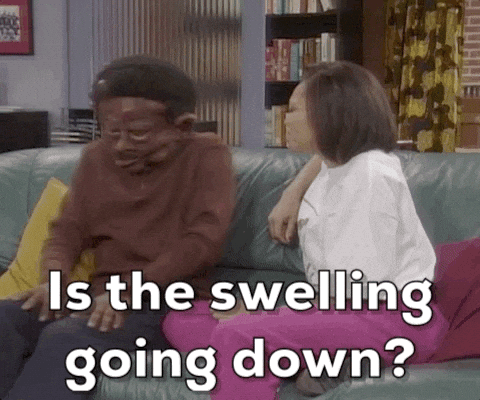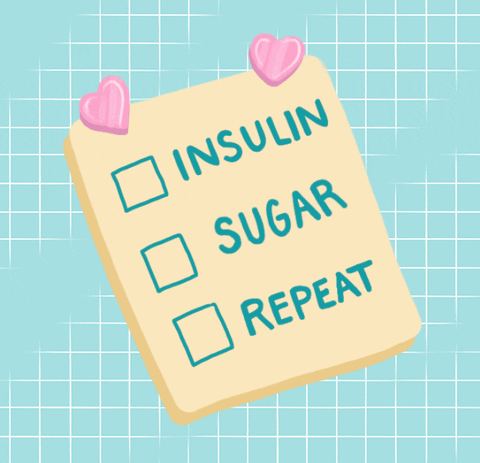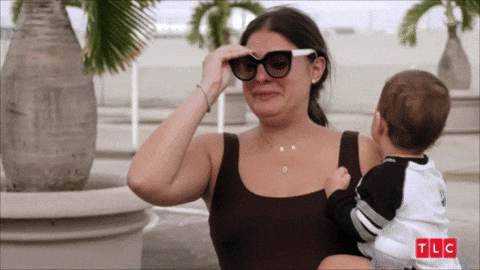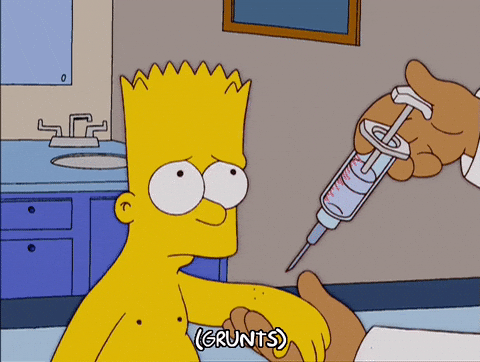
Friendship break-ups are hard — hell, sometimes even flat-out devastating. There are articles out here that say that they’re actually a close equivalent to having a limb cut off, that it can take more out of you emotionally than going through a breakup or “falling out of love” and, because sometimes it can be as life-altering as the death of a loved one, the grieving process of losing a friend can take years to get over/past/through.
Yeah, friendship break-ups can totally wear you out on a myriad of different levels — believe me, I know.
So, what do you do if, after going through one and doing some healing, a former friend comes back into your world and wants to try and reconcile? Is that something that should even be up for consideration? Oh, if only there was a cut-and-dried or black-and-white answer for that. The reality is, since each friendship is so unique that it pretty much has its own “fingerprint,” there is no simple yes or no resolve.
However, I do think that I can provide you with a few things to strongly consider (and perhaps even journal about) so that you will end up making the kind of decision that you can feel good about; the kind that you can make real and lasting peace with.
If there is a former friend who has recently resurfaced on some level and you’re wondering if a “round two” of friendship is in the cards for you, here are some things that you should think long and hard about before saying or doing anything about…it all.
Why Did the Friendship End to Begin With?
 Giphy
GiphyNot too long ago, I ran into someone who I hadn’t seen in years. As we were catching up, one of the things that she inquired about was the status of someone who we have in common — or at least used to. I’m definitely not friends with this person anymore because, let’s just say that they did something that was so selfish and even emotionally cruel, that there is simply no coming back from it. That said, I haven’t not forgiven them; it’s just that, even though I knew that they had some narcissistic traits, I didn’t realize that they were capable of going as low as they did or that they would absolutely suck at holding themselves accountable when I brought the issue to their attention.
Y’all, when it comes to reconciling with someone on the friendship tip, while I am sometimes open to the possibility, what I am absolutely not interested in is when those who don’t take accountability for their actions try to come at me on some, “Girl, you’re still on that? When are you going to let that go?” gaslighting mess. And why is that the case? Because if someone isn’t willing to acknowledge what they did — or how you feel about what they did — there is a huge chance that they are going to repeat the same actions…and next time, it could be worse.
And so, before doing anything else, the first thing that you should reflect upon is why the friendship break-up transpired in the first place. Was it just a big misunderstanding or did some pretty damning things transpire that revealed a lot about the person’s character and/or their commitment (or lack thereof) to the friendship overall? It’s hard to begin something new if you’re not sure about why “it” ended to begin with.
Have You BOTH Taken Accountability?
 Giphy
GiphySpeaking of accountability, it takes two people to be friends and usually, it takes the actions (or inactions) of two people, at least on some level, to bring a friendship to an end as well — and that brings me to the next point. Many years ago, a former friend of mine decided to marry a guy who had all sorts of red flags. Partly because I’m a marriage life coach and then partly because I’m simply Shellie, all of my friends know that if I see a very potential relational trainwreck about to happen, I’m absolutely going to speak up — and with her, I did. Her church told her that I was being an “enemy” of the engagement (chile) and so she ended our friendship.
I believe she was still in her newlywed years when we ran into each other at an event. All she did the entire time was sob and, although we weren’t friends anymore, because I did still care about her, afterward, we spoke for several hours — about everything, including what ultimately transpired between us. I was glad that we had that conversation because I was able to take accountability for how abrupt I was and how I could’ve been more compassionate and she took accountability for not standing up for herself enough to where some strangers (of our friendship) could get her to make such a drastic decision.
Still, when it was all said and done, although I was glad that we were able to make peace when she mentioned us exchanging numbers so that we could go thrift store shopping (which is totally one of my favorite things to do to this day), I passed. After sharing some of the things that she was going through now that she actually was a wife, there was nowhere for us to go. I still wasn’t in support and yet I’m no idiot — a person’s spouse needs to take priority over their friendships (some folks seem to forget/ignore that) and so there was no point in putting either one of us through “act two” of the drama and trauma.
Yet remember again what I said: we both were in a peace-filled place and that wasn’t the case when we initially “broke up” — and the only thing that really brought us there was us both holding ourselves accountable. The takeaway here is definitely don’t consider trying again with someone if you’re both not willing to own what brought you to the ending of your friendship in the first place. Why? Because if neither of you changed, what’s going to be different now? Straight up.
Let’s Go Back Over What “Reconcile” Means
 Giphy
GiphySo, what if, in your opinion, what led to the breakup is truly something that you can get past and both of you have been very open, honest, and candid about what y’all could’ve/should’ve done better? What next? Well, my recommendation would be to keep in mind that “there are layers to this thing” as far as reconciliation is concerned. What I mean by that is, that there are different definitions of the word and so, you need to decide what your goal is — and by that I mean, what actually would be best for you and them.
Reconcile: to cause (a person) to accept or be resigned to something not desired; to win over to friendliness; cause to become amicable; to compose or settle (a quarrel, dispute, etc.); to bring into agreement or harmony; make compatible or consistent; to restore
Another friendship story — this time, it’s with a guy. After almost three decades of being close, a former friend of mine got a girlfriend; one who, after only a few weeks, decided that she should “pull rank” on our friendship…and chile, he allowed it. Suddenly, he was sneaking to talk to me on the phone or rushing off whenever she was around. He was basically treating me like a side chick which was weird as hell because our friendship had literally “survived” a fiancée and a wife (two different women) with no problems. The way he handled all of that, I lost so much respect for him that I ended the friendship.
The birthday following our break-up, he sent me some money and I asked him what his agenda was. He said that he wanted the friendship back, that his relationship was toxic and yet, he was still going to keep her in his life while trying to rebuild our friendship. Are you kidding me? To choose chaos is…chaotic. And so, the kind of reconciling that I decided to do with him was that first definition: get him to realize that we can’t be friends when he’s with a woman who moves like she does. We can be cool, but our intimacy is over. She’s unsafe which made him unsafe (for me) too (check out “Are You An Emotionally & Relationally Safe Person To Be Around? 6 Ways To Know.”).
Then there’s the type of reconciliation that I spoke about right before this. By talking everything out with “her,” we were able to get to an amicable place and position — and sometimes, that’s all that needs to happen because, as I oftentimes say, you get old (and mature) enough and you both realize and accept that there is a significant amount of space between “friend” and “enemy” — many relationships (or situations or interactions) fall somewhere in there.
And then there’s the kind of reconciliation that literally brings two people back together. That requires settling matters and then seeing if you can get back into some sort of holistic agreement so that the relationship can be restored — and that takes quite a bit of mutual time and effort.
That’s why, the next thing that I recommend is asking yourself what kind of reconciling you’re after: getting clarity on why things need to remain as they are; a conversation that can bring both of you into a state of peace, so that folks aren’t rolling eyes at the mall or being passive aggressive on social media? Or do you feel like there is enough to salvage to where you want to try to be friends again?
Now, let me just say that before you give (yourself) an answer, restoration is a bit of a layered word too:
Restore: to bring back into existence, use, or the like; reestablish; to bring back to a state of health, soundness, or vigor; to put back to a former place, or to a former position, rank, etc.; to give back; make return or restitution of (anything taken away or lost)
Synonyms: bring back, build up, improve, reinstate, repair, revive, replace, rescue, strengthen
What these definitions amplify is if you’re thinking about restoring a friendship, you’ve got to ponder all of these definitions, so that you can know what it will require and entail. I mean, do you want to bring it back to where it was before? If so, why? Are you both willing to “make restitution” by making amends for what you both may have emotionally lost as a direct result of the break-up? Was your friendship even healthy to begin with? Because you can’t bring something “back to a healthy state” unless it was initially in one (and that’ll preach!).
Yeah, a part of the reason why I even wanted to tackle this topic is some folks think that “fixing a friendship” is simply a matter of saying that you did — oh, but it requires so much more work than that, chile. That’s why you’ve really got to be real with yourself about if it’s even worth it. Is it?
If Things Aren’t Going To Be Better Than Before, What’s the Point?
 Giphy
GiphyDid you notice how synonyms for restore included things like “improve” and even “replace”? When it comes to most of my broken friendships, while again, I have done my part to make sure that there is peace between us, I can’t really say that “getting back with them” would result in a better-than-before dynamic. For one thing, with some of the folks I was friends with, at the time when we became friends, I wasn’t even really friends with myself (check out “Self BFF: 7 Signs You're Your Own Best Friend”) and so I selected them from a broken and/or dysfunctional head and heart space. Others? Because they keep a victim mentality and refuse to take accountability for the breakdown, I simply don’t trust them or see the need to invest in them on a friendship level.
Listen, the folks who I consider to be my friends, they know that I’ve got them and then some and so, especially at this point and place in my life, if a person, place, thing, or idea isn’t going to make me a better person, I don’t see the point in bringing it/them into my intimate space. And definitely, if I’m going to put in the blood, sweat, and tears that are needed to restore a friendship, I’m going to need to see some indications that not only is it NOT going to be a sequel of what we already went through, but that we are BOTH going to do what’s needed for things to be so much better. Otherwise, again, what’s the point?
On repeat for the people in the back: If you’re going to reconcile, just for more of the same — and that was oftentimes stuff that wasn’t good — sis, what’s the point?
Implement a “Probationary” Period
 Giphy
GiphyIt’s pretty common that when someone first gets hired for a job, they are (usually) given a 90-day probationary period. The main point of that is to see if a new employee is truly a good fit for the job. Personally, when it comes to reconciling with a former friend, I think a similar practice should be limited. I mean, people can say anything — before going all in again, ease into things. Give it a few weeks to see if you both have healed, if growth has truly transpired, and if you still work, as friends, after all that has happened.
By not jumping totally in, that helps you to guard your heart, so that if one or both of you discover that either a friendship isn’t going to work or that it’s time to transition into a different kind of dynamic, feelings are spared and there’s not so much “spilled milk” to clean you. You can transition smoothly with fonder memories in tow.
____
Should you reconcile with a friend? I’ll end this with a quote by civil rights activist John M. Perkins: “There is no reconciliation until you recognize the dignity of the other until you see their view — you have to enter into the pain of the people. You've got to feel their need.” If neither of you is at this place, while there may be a need for a conversation, a reconciliation may be premature…if necessary, at all.
Again, if you’re going to enter into phase two of a relationship with a former friend, it should be better than it was before. I hope all of this will help you to determine if that is indeed the case…or not.
Either way, your time, heart, and investments are precious. Reconciliation or not, for your own sake, please choose wisely.
Let’s make things inbox official! Sign up for the xoNecole newsletter for love, wellness, career, and exclusive content delivered straight to your inbox.
Featured image by NoSystem images/Getty Images
This Is How To Keep 'Holiday Season Stress' From Infecting Your Relationship
Hmph. Maybe it’s just me, but it seems like there is something really weird happening in the fall season air (because winter doesn’t officially begin until December 21) that cuddle season is in full swing while break-up season is as well. In fact, did you know that break-ups are so popular during the holiday season that December 11 is deemed Break-Up Day?
The reasons why relationships shift around this time vary; however, I did both roll my eyes and chuckle when I read that a very popular one is because it’s an easy way to get out of getting one’s significant other a Christmas present. SMDH.
Anyway, I personally think that the less shallow folks out here may contemplate calling things “quits” or they at least distance themselves a bit from their partner (and what I’m referring to is serious relationships) due to all of the stress and strain that oftentimes comes with the holidays whether it be financial, familial, due to their tight schedules or something else.
Listen, I would hate for you and your man to miss the fun and happiness of experiencing this time of year, all because you are so overwhelmed or irritated that you can’t really enjoy it. That’s why I have a few practical tips for how to avoid allowing the typical holiday season stress from INFECTING your relationship.
Manage Your Expectations
 Giphy
GiphyUnmanaged expectations. If there is a main reason why the holiday season tends to be so stress-filled for so many people, I’d bet good money that this is the cause. And when you’re in a long-term relationship, expectations can manifest themselves in all sorts of cryptic and/or unexpected ways. You might have relatives who assume that you are going to be with them for Thanksgiving or Christmas when you have other plans in mind. You might be thinking that you are going to spend one amount for presents while your man is thinking something totally different. When it comes to scheduling, your signals may be crossed.
And you know what? To all of these scenarios, this is where clear and consistent communication come in. Don’t assume anything. Don’t dictate anything either. From now until New Year’s, mutually decide to check in once a week, just to make sure that you are both on the same page as it relates to the holidays and what you both are thinking will come along with it. The less blindsided you both feel, the less stressed out you will be. Trust me on this.
Set (and Keep) a Budget
 Giphy
GiphyOkay, so I read that last year, 36 percent of Americans incurred some type of holiday-related debt. Hmph. Last year, there was still some sense of normalcy in this country, chile, so I can only imagine what finances are gonna look like over the next several weeks. That said, since I don’t know a lot of people who don’t find being broke stressful, make sure that you and your bae set a budget and then stick to it this year — no ifs, ands or buts.
Because really, y’all — it doesn’t make sense to deplete savings and/or max out credit cards for a few days of giggles only to be damn near losing your mind because you don’t know how to make ends meet come Dr. Martin Luther King, Jr. Day.
And by the way, this tip doesn’t just speak to things like food and gifts; I also mean travel. If it doesn’t make a ton of sense (or cents) to be all over the place this year — DON’T BE.
Keep Matthew 5:37 at the Forefront
 Giphy
GiphyIf off the top of your head, you don’t know what Matthew 5:37 says, no worries, here ya go: “But let your ‘Yes’ be ‘Yes,’ and your ‘No,’ ‘No.’ For whatever is more than these is from the evil one.” That verse right there? Oh, it’s a boundaries lifesaver! I say that because do you see “maybe” or “I’ll think about it” in there? Nope. LOL. It says that you should tell people “yes” or “no” and leave it at that — and that complements Anne Lamott’s quote, “’No’ is a complete sentence” impeccably well. Yeah, you’ve got to remember that anything beyond a yes or no to a request is privileged information; you don’t owe anyone details or an explanation.
Besides, if you are really honest with yourself, when someone asks you something and you give a “Umm, let me think about it” kind of reply, more times than not, you already know what your answer is going to be — so why not let you both off of the hook? Give your response. Commit to that. And let everyone (including yourself) get on with their lives and schedules.
I promise you that when it comes to those holiday parties, you are pissing more folks off by not RSVP’ing or doing so and not showing up than just saying, “Thank you but not this year” off the rip.
Remember That Your Personal Space Is Privilege Not a Right
 Giphy
GiphyA friend of mine recently bought a new house and invited me over to come see it. He’s a single man with no children, so as I was taking in all of the space that he had, especially as I walked through his finished basement, I joked about relatives coming to live with him. “Hell no” and “absolutely not” were pretty much his immediate responses as he went on to say that some folks even had the nerve to be offended when he told them that he had no intentions on taking DNA in.
Ain’t it wild how people think that your stuff is their right? And yes, that brings me to my next point. Your home is your sanctuary space. If you want to host folks this year — cool. If not, ALSO COOL. Please don’t let folks (family included) guilt you into how they want you to act or even into what they would do if the shoe was on the other foot. You are not them — and as one of my favorite quotes states, “If two people were exactly alike, one of them would be unnecessary.” (A man by the name Larry Dixon said that.)
Hell, my friends? They know that I am good for sending them random things that they need or even want all throughout the year. Coming over to hang out at my pace, though. Uh-uh. Chalk it up to being a card-carrying member of the ambivert club yet I like keeping my living space personal — and I sleep like a baby, each and every night, for feeling that way.
Always remember that your space, your time, your resources, your energy and shoot, yourself period (including your relationship), are all things that are your own. You get to choose how, when and why you want to share them. The holiday season is certainly no exception.
Cultivate Some “You Two Only” Traditions
 Giphy
GiphyIt’s not uncommon for some couples to hit me up after the holiday season to “detox.” Sometimes it’s due to the financial drama (and sometimes trauma) that they experienced. Sometimes it’s because they allowed their relatives (especially in-laws) to get more into their personal business than they should’ve. More than anything, though, it tends to be because they didn’t get enough quality time together and so ended up feeling “disconnected.”
Please don’t let that happen. Listen, I’m not even a holidays kind of woman and yet, I will absolutely sit myself down with some hot chocolate and chocolate chip cookies to enjoy a Hallmark holiday film or two. Aside from the fact that most of them are lighthearted and sweet, I also like that they usually focus on couples loving on each other amidst all of the holiday beauty and ambiance — which is something that all couples should set aside some time to do.
Maybe it’s a vacation. Maybe it’s a staycation. Or maybe it’s my personal favorite, A SEXCATION. Whether it’s for a few days, the weekend or even overnight — don’t you let the holidays go by without setting aside time for you and your man to celebrate one another. Don’t you dare (check out “Are You Ready To Have Some Very Merry 'Christmas Sex'?”).
GET. SOME. REST.
 Giphy
GiphyI once read that 8 out of 10 people get stressed out over the holidays and 3 out of 10 lose sleep during to it — and when you’re stress-filled and sleep-deprived, that can absolutely lead to hypersensitivity, making mountains out of molehills and even not being in the mood for sex.
Your relationship can’t afford to go through any of this, so definitely make sure to prioritize rest. I don’t care how unrealistic it might seem during this time, sleep should never be seen as a luxury; it will always and forever be a great necessity.
That said, try to get no less than six hours of shut-eye in (check out “6 Fascinating Ways Sex And Sleep Definitely Go Hand In Hand”) and even ask your bae to take a nap with you sometimes (check out “Wanna Have Some Next-Level Sex? Take A Nap, Sis.”). Not only will sleep help to restore your mind, body and spirit but, when it’s with your partner, it’s an act of intimacy that can make you both feel super connected, even in the midst of what might feel like chaos.
___
Holiday season stress is real. Still, never give it the permission or power to throw your relationship off. Put you and your man first and let the holidays be what they are gonna be, chile.
Let’s make things inbox official! Sign up for the xoNecole newsletter for love, wellness, career, and exclusive content delivered straight to your inbox.
Featured image by Shutterstock
While doing a podcast interview a couple of weeks ago, when I said my age, the interviewer complimented me by saying that what I said is not what they would’ve guessed. When they asked what the secret was, the first thing that came out of my mouth was, “Oh, I’m gonna take me a nap.”
I adore sleep. I’ve said before that it’s like what Six Flags is to some people. And really, it’s just a plus that there are so many health benefits from getting plenty of rest. Beauty-wise, science does reveal that getting no less than seven hours a night can slow down signs of aging. Know what else? There are some direct things that sleep — and the lack thereof — can do to your immunity as well.
And so, since this is the time of year when catching a cold (and/or the flu) is common, let’s talk about the impact that sleep (and again, a lack thereof) has on your immune system. That way, you can remain as healthy as possible during the fall and winter seasons.
1. Less Sleep Means More Colds
 Giphy
GiphyLike I stated in the intro, I’m pretty sure you’ve heard somewhere that the fall and winter are the seasons when people are most susceptible to catching a cold or coming down with the flu. And that’s exactly why I thought I would start this all off by sharing the fact that some studies reveal that if you get less than six hours of sleep, on a consistent basis, you end up making yourself more vulnerable to coming down with both. In fact, some research says that only 18 percent of people who get six-plus hours of rest caught a cold while almost 40 percent who got less than that did.
The logic behind it all is sleep gives your body time to build up the proteins and cells (like cytokines and T-cells) that you need to fight off certain viruses. So, if nothing bothers you more than having a stuffy nose or stubborn cough when it’s cold outside, getting more sleep is one way to prevent that from happening to you.
2. Less Sleep Means More Allergy Symptoms
 Giphy
GiphyAt the end of the day, an allergy is basically what transpires whenever your immune system “overreacts” to something that other people’s systems do not. And since sleep is what helps to keep your immune system nice and strong — well, I’m sure you get how less allergy-related symptoms and more sleep go hand in hand. Also, since sleep helps to decrease bodily inflammation (more on that in a bit) and inflammation can also intensify allergy symptoms, that’s just one more reason to get as much shut-eye as possible.
3. Less Sleep Means Potential Diabetes and Heart Disease
 Giphy
GiphyDid you know that in 2024, Black women were diagnosed with diabetes 24 percent more than any other adult demographic. Also, it continues to be a reality that heart disease is the leading cause of death for Black women. These two sobering statistics alone should be enough of an incentive to do whatever you can to keep the risk of diabetes and heart disease way down.
One way to do that is by getting more sleep. Aside from the fact that sleep strengthens your immune system to where it is easier for you to fight off illness and diseases, sleep can keep your blood sugar levels in a healthy space; plus, when it comes to your heart, it gives it, along with your arteries and blood vessels a break.
4. Less Sleep Means Less Time for Your Body to Push “Reset”
 Giphy
GiphyIf you really stopped to consider all that your body goes through during the day (you can read some about that here), you definitely would respect it enough to do your best to thank it by giving it no less than six hours of sleep, each and every night. Sleep is what helps to slow your brain and body down so they are able to “refuel” for the next day. After all, how can your body prevent you from getting sick if your immune system is too worn out to fight ailments off? Exactly.
5. More Sleep Helps You to Fight Off Infections
 Giphy
GiphySpeaking of, in order for your body to fight off infections, there are certain cells and antibodies within you that need to be healthy and strong — one way that they get and stay that way is by you getting a good amount of sleep. For instance, remember when I touched on cytokines earlier? Well, the same way that they help to prevent colds, they also help to prevent infections too. And since sleep lowers your cortisol (stress) levels, rest gives your body the time and space to build up an army that can fight off free radicals and other health-related challenges while you are awake.
6. More Sleep Lowers Bodily Inflammation
 Giphy
GiphyWhenever a health-related issue is mentioned on this platform, inflammation is something that is mentioned quite a bit. Probably the easiest way to explain inflammation is it’s how your body responds/reacts whenever something is happening to your body that shouldn’t be, whether it’s an illness, an injury, a germ or something that you may be allergic to.
If you happen to have chronic inflammation, some symptoms that are associated with that include fatigue, stiff joints, skin rashes, weight gain and moodiness.
The interesting thing about all of this is if you aren’t getting enough rest, you could be triggering inflammation in your body. That’s because studies reveal that a lack of sleep can elevate molecules that are associated with inflammation. So, if you don’t want inflammation to increase within your system, you should definitely catch more zzz’s.
7. More Sleep Regulates Hormones
 Giphy
GiphyWhen it comes to hormones like serotonin, estrogen and cortisol, believe it or not, they play a role in how your immune system acts and overreacts. That’s because, if your hormones are out of balance, that can cause your immune system to work harder than it actually should and that can make you more vulnerable to sickness. One way to keep your hormones leveled out? SLEEP.
That’s because sleep gives your body the opportunity to rest, repair and restore your hormone levels. On the other hand, when you are sleep deprived, that can put/keep your hormones on the ultimate roller coaster ride. #notgood
8. More Sleep Strengthens Vaccines
 flu shot GIF - Find & Share on GIPHYGiphy
flu shot GIF - Find & Share on GIPHYGiphyIf you’re someone who is good for getting some sort of vaccine around this time of the year, make sure that you rest up before and after getting your shots. Not only does adequate rest before a vaccination help your immune system to be better receptive to your shots but sleep also helps your body to build up enough antibodies to make your vaccinations effective after getting them. Because if you’re gonna get pricked, shouldn’t it be worth it? My thoughts exactly.
Get some freakin’ sleep! Your immune system depends on it.
Let’s make things inbox official! Sign up for the xoNecole newsletter for love, wellness, career, and exclusive content delivered straight to your inbox.
Featured image by Shutterstock







